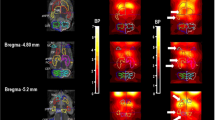Abstract
RECENTLY a direct correlation has been reported between spontaneous motor activity, tyrosine hydroxylase activity and the responsiveness of the noradrenaline sensitive cyclic AMP-generating system in rat brain1,2. These observations may indicate that the turnover and/or level of noradrenaline in the brain is important in determining the sensitivity of the cyclic AMP-generating system to noradrenaline. Indeed, it has been shown that depletion of brain noradrenaline by the intraventricular injection of 6-hydroxydop-amine results in supersensitivity of the system to noradrenaline3,4. Furthermore treatment with reserpine, a drug known to cause depressive reactions in man, has been reported to increase the sensitivity of the adenylate cyclase of rat brain to noradrenaline5 and several antidepressant drugs have been shown to have the opposite effect in limbic forebrain6. By contrast, we now present evidence that the chronic treatment of rats with both an antidepressant, imipramine, and a depressant, chlorpromazine, reduces the sensitivity of the cyclic AMP-generating system to noradrenaline.
This is a preview of subscription content, access via your institution
Access options
Subscribe to this journal
Receive 51 print issues and online access
$199.00 per year
only $3.90 per issue
Buy this article
- Purchase on Springer Link
- Instant access to full article PDF
Prices may be subject to local taxes which are calculated during checkout
Similar content being viewed by others
References
Skolnick, P., and Daly, J. W., Science, 184, 175–177 (1974).
Segal, D. S., Kuczenski, R. J., and Mandell, A. J., Behav. Biol., 7, 75–81 (1972).
Huang, M., Ho, A. K. S., and Daly, J. W., Molec, Pharmac., 9, 711–717 (1973).
Kalisker, A., Rutledge, C. O., and Perkins, J. P., Molec. Pharmac., 9, 619–629 (1973).
Williams, B., and Pirch, J. H., Brain Res., 68, 227–234 (1974).
Vetulani, J., and Sulser, F., Nature, 257, 495–496 (1975).
Schultz, J., and Daly, J. W., J. biol. Chem., 248, 843–852 (1973).
Schultz, J., J. Neurochem., 24, 495–501 (1975).
Gilman, A. G., Proc. natn. Acad. Sci. U.S.A., 67, 305–312 (1970).
Hughes, I. E., Kneen, B., and Main, V. A., J. Pharm. Pharmac., 26, 903–904 (1974).
Burt, D. R., Enna, S. J., Creese, I., and Snyder, S. H., Proc. natn. Acad. Sci. U.S.A., 72, 4655–4659 (1975).
Seeman, P., Chau-Wong, M., Tedesco, J., and Wong, K., Proc. natn. Acad. Sci. U.S.A., 72, 4376–4380 (1975).
Farnebo, L. O., and Hamberger, B., Acta physiol. scand. Suppl., 371, 35–44 (1971).
Stadler, H., Ciria, M. G., and Bartholini, G., Naunyn-Schmiedeberes Arch. Pharmac., 288, 1–6 (1975).
Gokhale, S. D., Gulati, O. D., and Parikh, H. M., Br. J. Pharmac., 23, 508–520 (1964).
Author information
Authors and Affiliations
Rights and permissions
About this article
Cite this article
SCHULTZ, J. Psychoactive drug effects on a system which generates cyclic AMP in brain. Nature 261, 417–418 (1976). https://doi.org/10.1038/261417a0
Received:
Accepted:
Issue Date:
DOI: https://doi.org/10.1038/261417a0
This article is cited by
-
Effects of subchronic administration of antidepressants and anxiolytics on levels of the ? subunits of G proteins in the rat brain
Journal of Neural Transmission (1997)
-
Behavioral evidence for ?-adrenoceptor subsensitivity after subacute antidepressant/? 2-adrenoceptor antagonist treatment
Naunyn-Schmiedeberg's Archives of Pharmacology (1985)
-
Effect of destruction of central noradrenergic and serotonergic nerve terminals by systemic neurotoxins on the long-term effects of antidepressants on?-adrenoceptors and 5-HT2 binding sites in the rat cerebral cortex
Journal of Neural Transmission (1984)
-
Antagonism of behavioural depression produced by clonidine in the mongolian gerbil: a potential screening test for antidepressant drugs
Psychopharmacology (1983)
-
The effect of chronic treatment with antidepressant drugs on salbutamol-induced hypoactivity in rats
Psychopharmacology (1983)
Comments
By submitting a comment you agree to abide by our Terms and Community Guidelines. If you find something abusive or that does not comply with our terms or guidelines please flag it as inappropriate.



